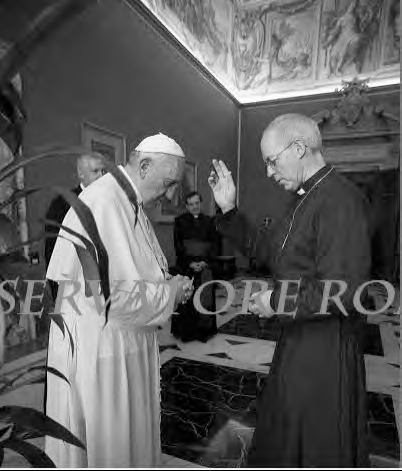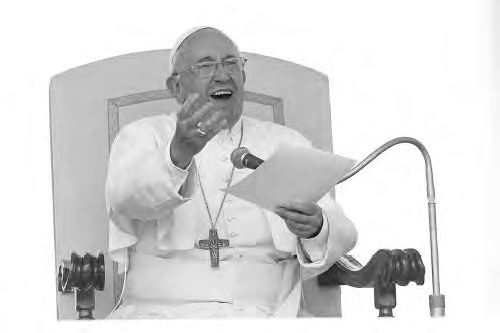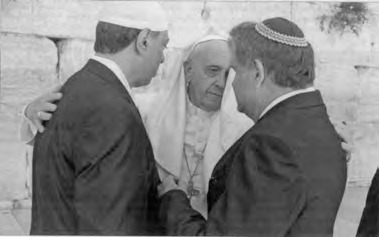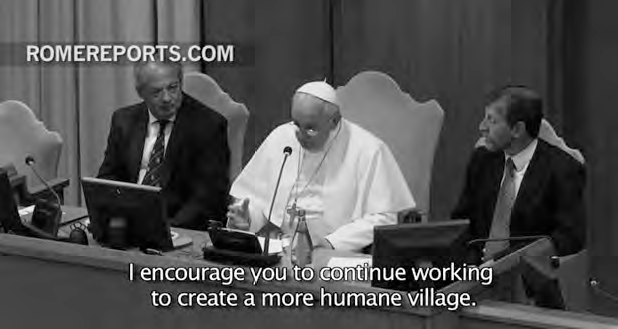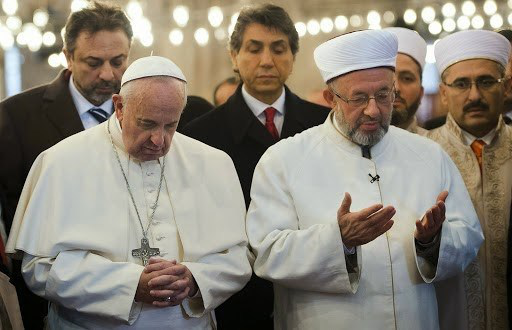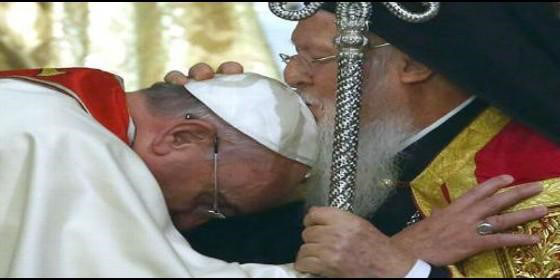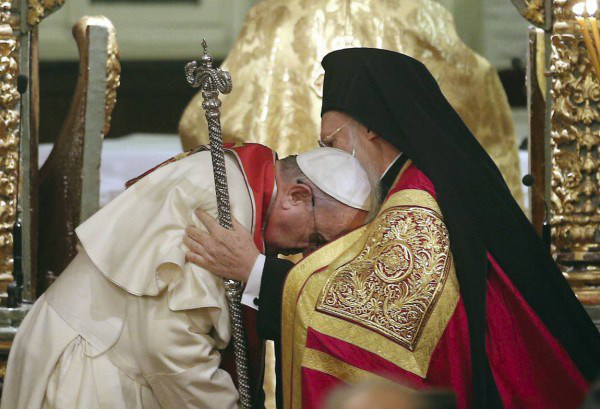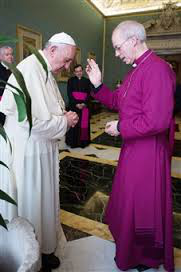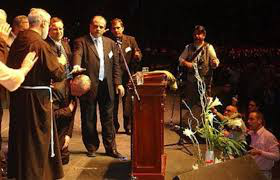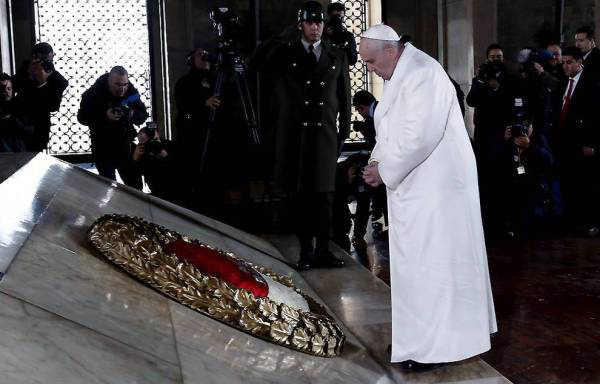ON THE DEPOSITION OF THE POPE – continued (Part 2 of 2)
Text of John of St. Thomas O.P.
Translated from the Latin and annotated by Fr. Pierre-Marie O.P. (Avrillé. France)
and published in Le Sel de la Terre [No. 90, Fall 2014]
Translated from French to English by Fr. Juan Carlos Ortiz
…
Response to the objections
It is easy to answer the objections of Bellarmine and Suárez against this view.
Objection 1. “A heretic is not a member, so cannot be head of the Church”
Bellarmine objected that the Apostle [St Paul] says that we must avoid the heretic after two admonitions, that is to say, after he clearly appears pertinacious, before any excommunication and sentence of a judge, as St. Jerome says in his commentary, for heretics separate themselves by the heresy itself (per se) from the Body of Christ.
And here is his reasoning:
- A non-Christian cannot be Pope, for he who is not a member [of the Church] cannot be the head; now, a heretic is not a Christian, as commonly say the Fathers; thus, a manifest heretic cannot be Pope.
- One cannot object that a character remains in him , because if he remained Pope because of a character, since it is indelible, it could never be deposed. This is why the Fathers commonly teach that a heretic, because of heresy and regardless of excommunication, is deprived of any jurisdiction and power, as say St. Cyprian, St. Ambrose and St. Jerome.
Answer:
I answer [to Bellarmine] that the heretic should be avoided after two admonitions legally made and with the Church’s authority, and not according to private judgment; indeed, a great confusion in the Church would follow , if it was allowed that the admonition is made by a private man, and that the manifestation of this heresy having been made without being declared by the Church and proclaimed to all, in order that they avoid the Pontiff, that all should be required to avoid; for a heresy of the Pope cannot be public for all the faithful on the report of a few, and this report, not being legal, does not require that all believe it and avoid the Pontiff; and therefore as the Church proclaims him legally elected by legally designating him for all, it is necessary that she deposes him by declaring and proclaiming him as a heretic to be avoided.
Therefore, we see that this has been practiced by the Church, when in the case of the deposition of the Pope, the cause itself was first addressed by the General Council before the Pope was declared “No Pope”, as we said above. Therefore it is not because the Pope is a heretic, even publicly, that he will ipso facto cease to be Pope, before the declaration of the Church, and before she proclaims him as “to be avoided” by the faithful.
And when St. Jerome says that a heretic separates itself from the body of Christ, he does not exclude a judgment of the Church, especially in such a serious matter as the deposition of the Pope, but it indicates only the quality of the crime, which excludes per se from the Church, without any further sentence, at least from the moment he is declared [heretic] by the Church; indeed, even if the crime of heresy separates itself (ex se) of the Church, however, in relation to us that separation is not understood as have been made (not intelligitur facto) without this statement.
It is the same thing from the reason added by Bellarmine. A non-Christian who is such in itself AND in relation to us (quoad se et quoad nos) cannot be Pope; however, if he is not in itself a Christian, because he has lost the faith, but if in relation to us he is not legally declared being infidel or heretic, as obvious as it may appear in a private judgment, he is still in relation to us (quoad nos) a member of the Church and therefore the head. Accordingly, a judgment of the Church is required through which he is declared (proponatur) as being a non-Christian and to be avoided, and then he ceases in relation to us to be the Pope, consequently, previously he did not cease to be himself (etiam in se) [Pope], because all what he did was valid in itself.1
Objection 2. “The Church has no power over the conjunction of the Pontificate with the person.”
The points of this objection are these:
- [a] The Church cannot have power over the conjunction of the pontificate with the person, unless you have power over the Papacy itself; indeed, when the Pope deposes a bishop he does nothing else than to destroy his conjunction with the episcopate, though he does not destroy the episcopate itself; therefore, if the Church has power over the conjunction of the Pontificate with the person, consequently she has power over the Papacy and the person of the Pope.
- [b] A confirmation of this argument is that the Pope is deposed against his will, therefore, he is punished by this deposition; but it belongs to the superior and to the judge to punish. Therefore, the Church who deposes or punishes through the punishment of deposition, has superiority over the Pope.
- [c] Finally, one who has power over the united parties or their conjunction simply has power over the whole. Therefore, if the Church has power over the conjunction of the Pontificate with the person, she has simpliciter power over the Pope, which Cajetan denies.
Answer:
[a] We answer that it is not in the same manner that the Pontiff has power over the bishop when he deposes him, and the Church over the Pontiff: indeed, the Pontiff punishes the bishop as someone who is subjected to him, [the latter] being invested with a subordinated and dependent power, which [the former] can limit and restrict; and, although it does not remove the episcopate from the person [punished], nor destroys it, nevertheless he does it by the superiority he has over the person, including in this power which is subordinated to him. That is why he really removes the power to [from] that person, and does not just remove that person from power. On the contrary, the Church removes the Pontificate not by superiority over him, but by a power which is only ministerial and dispositive, in so far as she can induce a disposition incompatible with the Pontificate, as it was said.
[b] In response to the confirmation of the reasoning, the Pope is deposed against his will, in a ministerial and dispositive manner by the Church, [but] authoritatively by Christ the Lord, so that through him, and not by Church, he is properly said punished.
[c] Regarding the latter reason, he who has power over the conjunction of the parties has power over the whole simpliciter, unless his power over the conjunction is ministerial and dispositive; we must distinguish between
- physical realities when the dispositions have a natural connection to the very being of the whole, so that when the agent realizes the combination producing the dispositions binding the parties, it produces the whole simpliciter;
- and moral realities, in which the disposition made by the agent has only a moral connection with the form, in relation to a free institution, so that he who does the disposition is not supposed to do the whole simpliciter; for example, when the Pontiff grants to anyone the power to designate a place to be favored to gain indulgences, or remove indulgences by saying that the place is not privileged anymore, that designation or declaration removes or grants indulgences, not with authority and principaliter, but only ministerially.”
[End of John of St. Thomas’s text]
Some thoughts as a conclusion
The main argument of sedevacantists concluding on the vacancy of the Apostolic See is “the theological argument of the heresy of the Pope,” namely of a Pope who becomes a heretic loses the Pontificate.
In the “Small Catechism on Sedevacantism” (Le Sel de la terre 79, p. 40), Dominicus explained that this argument cannot conclude, on the one side because it would be necessary to prove the formal and manifest heresy of the Pope, on the other, because a judgment of the Church stating that heresy would be necessary.
The text of John of St. Thomas develops this second point: the need for a judgment of the Church for the deposition of a heretical pope.
But at the same time, it shows the difficulty of such a judgment in the present circumstances of the Church. Indeed, it is easy to see that the vast majority of bishops share the Pope’s ideas about false ecumenism, false religious freedom, etc. It is therefore impossible to imagine in the current circumstances, a judgment of a General Council which would declare the heresy of Pope Francis.
Humanly speaking we see the situation is hopeless. We must wait that the Providence, in one way or another, shows the way to overcome this impasse. Meanwhile, it is prudent to maintain the position of Archbishop Lefebvre and pray for the Pope, while resisting his “heresies”.
Annexes
Here we give some other texts from Thomist authors who share the view of Cajetan and John of St. Thomas: Báñez, the Carmelites of Salamanca, Billuart and Fr. Garrigou-Lagrange.
Báñez
Domingo (Dominicus) Báñez or Bannez O.P. (1528-1604) is one of the greatest theologians of the 16th century, the golden age of Theology in Spain (with Francisco de Vitoria, Domingo de Soto, Melchior Cano, Bartholomew Medina and Pedro de Sotomayor).
Báñez is regarded, rightly, as one of the most profound and safest commentators of the doctrine of St. Thomas. His style is clear, sober and nervous, without darkness or false elegance. His erudition is abundant, without ostentation or clutter. His logic power and intelligence of metaphysics are particularly noteworthy, and on this ground exceeds his teachers and his most famous colleagues. (P. MANDONNET, D.T.C., “Bañez”)
In his commentary on the Summa Theologica, he defends the view that:
If the Supreme Pontiff falls into heresy, he does not lose immediately the Papal dignity, before he is deposed by the Church. (In II-II q. 1 a. 10)
He explained that a number of theologians believe that the Pope, once he becomes a heretic, immediately loses his power. But the opinion he defends is that of Cajetan, of which he summarizes the arguments:
- The other bishops, if they become heretics, retain their episcopal dignity until they are deposed by the Pope. […]
- If the Pontiff, once fallen into heresy, is ready to amend, he should not be deposed, as even those who hold the opposite view admit, so he does not cease to be Pope. […]
He then examines an objection against his thesis, and this is the most interesting passage for our study:
One objects that the Sovereign Pontiff ceases to be the head of the Church when he falls into heresy and therefore he ceases to be Pope. Indeed, as soon as he falls into heresy he ceases to be a member of the Church, so to be its head.
One easily answers this objection with the doctrine we have given while explaining the definition of the Church. The Pontiff is not said to be the head of the Church because of his holiness or his faith, because it is not thus that he influences the other members, but [rather] is said to be the head of the Church because of his ministerial office, which aims to govern the Church by defining the truth, by establishing laws, by administering the sacraments, all of which are carried out according externally according to a visible ecclesiastical hierarchy, and almost palpable. Besides, the fact that the Pontiff, because of his heresy, ceases to be a member of Christ, for he ceases to receive from Him the spiritual influence for his own sanctification, does not prevent him of being called the chief member of the Church, namely its head, in relation to the ecclesiastical government. Similarly, the head of a State is said to be the head of the Republic. As the notion of membership is employed metaphorically, we have said above that there may be different points of view of the metaphor: according to one point of view [Editor’s note: from the spiritual influence received from Christ] the Pontiff is not a member of Christ or the Church, and from another [Editor’s note: the power of government] he is a member. (Venice edition of 1587, columns 194-196)
The Carmelites of Salamanca
The composition of the Cursus theologicus salmanticensis extends over seventy years, during the last three quarters of the 17th century. It is a renowned theological course composed by six Discalced Carmelite theologians of Saint-Elias Convent of Salamanca. The convent was founded in 1581, during the life and under the counsel of St. Teresa of Avila.
They ask if the Pope, as an individual doctor, can become a heretic. They cite some authors who think it is not possible (Pighi, Bellarmine, Suárez), and they continue:
The contrary view (which states that the Pontiff as a private doctor can err, not only in secondary objects, but even on matters of faith, and not just with a non-culpable error coming from ignorance or negligence, but also with pertinacity, so that he is a heretic) is much more probable (longe probabilior) and more common among theologians.
Among the reasons they give in favor of their opinion, there is this one:
Because the Church may depose the Pontiff of his dignity, as Cajetan shows in his Treatise on the Authority of the Pope (from chapter 20 to chapter 26) and Melchior Cano in his book De Locis theologicis (book 6, chapter 8). But this power to depose is not vain in the Church, and it cannot be reduced to the act except if the Pontiff errs in the faith: so this error may be in the Pope as a private person. (De Fide, disp. 4 dubium 1, n. 7)
Billuart
Charles-René Billuart O.P. (1685-1757) is a French Thomist theologian. He composed a Theology course which enjoys a high reputation.
In the Treatise on the Incarnation (De Incarnatione, diss. IX, a. II, § 2, obj. 2) Billuart defends the thesis that Christ is not the head of heretics, even occult.
It is objected that several doctors (Cajetan, Soto Cano, Suárez, etc.) say that the Pope fallen into occult heresy remains the head of the Church. So he must be a member.
Billuart denies the conclusion:
There is a difference between being constituted a head by the fact that one is influencing on the members, and being made a member by the fact that one is receiving an influx in itself; this is why, while the pontiff [who] fell into occult heresy keeps the jurisdiction by which he influences the Church by governing her, thereby he remains the head; but as he no longer receives the vital influx of Christ‘s faith or charity, who is the invisible and first head, he cannot be said to be a member of Christ or of the Church.
Instance: it is repugnant to be the head of a body without being a member, since the head is the primary member.
Answer: I distinguish the first sentence: it is repugnant to a natural head, I agree; to a moral head, I deny it. For example, Christ is the moral head of the Church, but he is not a member. The reason for the difference is that the natural head cannot have an influence on other members without receiving the vital influx of the soul. But the moral head, as the Pontiff is, can exercise the jurisdiction and the government over the Church and its members, although he is not informed by the soul of the Church, which are faith and charity, and that he does not receive any vital influx.
In a word, the Pope is made a member of the Church through the personal faith which he can lose, and the head of the Church by the jurisdiction and the power which can be reconciled with an internal heresy. (Cursus theologiœ, Pars III, Venice, 1787, p. 66)
In the Treatise on Faith (De Fide diss IV to III, § 3, obj 2) Billuart defends the following thesis: Heretics, even manifest (unless being denounced by name, or by leaving the Church themselves) keep the jurisdiction and absolve validly.
He considers the question of the case of a Pope, which is a special case, who receives his jurisdiction not from the Church, but directly from Christ:
It is nowhere stated that Christ continues to give jurisdiction to a manifestly heretical Pontiff, for this can be known by the Church and she can get another pastor. However the common sentence [editor: opinion] holds that Christ, by a special provision (ex speciali dispensatione), for the common good and peace of the Church, continues [to give] jurisdiction to a Pontiff even who is a manifest heretic, until he is declared manifestly heretical by the Church. (Cursus theologiœ, Pars II-II, Brescia, 1838, p. 33-34)
In the Treaty on the Rules of Faith (De regulis fidei, diss IV, VIII a, § 2, obj 2 and 6) Billuart defends the following thesis: The sovereign Pontiff is superior to any council by authority and jurisdiction.
It is objected that the Pontiff is subject to the judgment of the Church in the case of heresy. Why then he would not be subject also in other cases?
He replies:
This is because in the case of heresy, and not in other cases, he loses the pontificate by the fact itself of his heresy: how could remain head of the Church he who is no longer a member? This is why he is subject to the judgment of the Church, not in order to be removed, since he is already deposed himself by heresy and he rejected the Pontificate (pontificatum abjecerit), but in order to be declared a heretic, and thus that he will be known to the Church that he is not anymore Pontiff: before this statement [of the Church] it is not permitted to refuse him obedience, because he keeps jurisdiction until then, not by right, as if he were still Pontiff, but in fact, by the will of God and accordingly disposing it for the common good of the Church. (Cursus theologiœ, Pars II-II, Brescia, 1838, p. 123)
Another objector remarked that the Church would be deprived of a remedy if she could not subject the Pope to the Council in the case that he would be harmful and would seek to subvert her.
Billuart replied that:
If the pope sought to harm her in the faith, he would be manifestly heretical, and he would thereby lose the Pontificate: however it should be necessary a declaration of the Church in order to deny him obedience, as we have said above. (Cursus theologiœ, Pars II-II, Brescia, 1838, p. 125)
If the Pope would harm the Church otherwise than in the faith, some say that one could resist him by the force of arms, however without losing his superiority. St. Thomas Aquinas said it would be necessary to appeal to God in order to correct him or taking him away from this world (4 Sent. D. 19, q. 2, a. 2 q.1a 3, ad 2).
Billuart prefers to think that:
Whereas God governs and sustains his Church with a special Providence, he will not permit, as he has not permitted it so far, that this situation will happen, and if he permits it, he will not fail to give the means and the help appropriate. (Cursus theologiœ, Pars II-II, Brescia, 1838, p. 125)
St. Alphonsus Liguori
St. Alphonsus Liguori (1696-1787), Doctor of the Church, devoted several writings in defense of Papal power against the conciliarist heresy (which gave to the councils a higher authority over the Pope). Collected in one volume by a Redemptorist religious on the eve of Vatican Council I, (Du Pape et du concile; Tournai, Casterman, 1869) these writings have helped to prepare the definition of the dogma of Papal infallibility. St. Alphonsus does not really treat the issue of a heretical Pope, and he excludes it so that it does not disturb his subject. But, without entering into the details, he said repeatedly that the heretical Pope loses his authority only when his heresy has been confirmed by a council. He clearly shares the view of Cajetan and John of St. Thomas.
In an essay on the authority of the Pope, added by St. Alphonsus at the end of the edition of his Moral Theology in 1748,2 the Holy Doctor vigorously defends the superiority of the Pope over the council, but beforehand he declares:
- It should first be noted that the superiority of the Pope over the council does not extend to the dubious Pope in the time of a schism when there is a serious doubt about the legitimacy of his election; because then everyone must submit to the council, as defined by the Council of Constance. Then indeed the General Council draws its supreme power directly from Christ, as in times of vacancy of the Apostolic See, as it was well said by St. Antoninus (Summa, p. 3 did. 23, c. 2 § 6).
- The same must be said of a pope who would be manifestly and exteriorly heretical (and not only secretly and mentally). However, others argue more accurately that, in this case, the Pope cannot be deprived of his authority by the council as if it were above him, but that he is deposed immediately by Jesus Christ, when the condition of this deposition [= the declaration of the council] is carried out as required.3
After presenting the views of Azorius (viz. that the council is above a manifestly heretical pope), St. Alphonsus nuances it and therefore ultimately follows the position of Cajetan and John of St. Thomas, considered as “more accurate”. St. Alphonsus did the same in his apologetical treatise Truth of Faith (1767):
“When in time of schism we are in doubt about the true Pope, the council may be convened by the cardinals and the bishops; and then each of the elected Popes is obliged to follow the decision of the council because, at that time, the Apostolic See is considered vacant. It would be the same if the Pope would fall notoriously and perseveringly, persistently in some heresy. However, there are those who affirm with more foundation that in the latter case, that the Pope would not be deprived of the papacy by the council as if it were superior to him, but he would be stripped directly by Jesus Christ because he would then become a subject completely disqualified and deprived of his office.” (Truth of Faith (1767), penultimate chapter “On the Superiority of the Roman pontiff over the councils”, art. I, Preliminary Notions, 2°)
St. Alphonsus defends again the same idea in 1768 in his refutation of the errors of Febronius:
If ever the Pope, as a private person, falls into heresy, then he would be immediately stripped of papal authority as he would be outside the Church and therefore he could not be the head of the Church. So, in this case, the Church should not truly depose him, because no one has a superior power to the Pope, but to declare him deprived of the pontificate. (We said: if the Pope fall into heresy as a private person, because the Pope as Pope, that is to say, teaching the whole Church ex cathedra cannot teach an error against Faith because Christ’s promise cannot fail). (Vindiciae pro suprema Pontificis potestate adversus justinum febronium, 1768, Chapter VIII, response to the 6th objection)
Father Garrigou-Lagrange O.P.
Father Garrigou-Lagrange examines the question of the heretical pope in his treatise De Christo Salvatore. (Marietti, Rome-Turin, 1946, p. 232) After explaining that Christ cannot be the head of a formal heretic, he concludes:
This is why a baptized formal heretic is not a member in act of the Church, yet the Church has the right to punish him, in so far as he does not hold what he has promised, like a king has the right to punish a deserter.
Bellarmine objects that a Pope fallen into occult heresy remains a member of the Church in act, for he remains the head of the Church, as taught [also] by Cajetan, Soto, Cano, Suárez and others.4
I answer that this case is quite abnormal, so it is no wonder that it follows an abnormal consequence, namely that an occult heretical Pope would not remain a member of the Church in act (according to the doctrine we have just described), but he would keep the jurisdiction by which he influences the Church by governing her. So he would retain the reason [= the nature] of head vis-à-vis the Church, on which he would continue to influence, but he would cease to be a member of Christ, because he would no longer receive the vital influx of the faith of Christ, the invisible and first head. Thus, in a quite abnormal manner, in relation to the jurisdiction he would be the head of the Church, but he would not be a member.
This would be impossible if it were a physical head, but it is not contradictory for a secondary moral head. The reason is that, while a physical head cannot exert any influence on the members without receiving the vital influx of the soul, a moral head, as is the [Roman] Pontiff can exercise jurisdiction on the Church even if it [he] receives from the soul of the Church no influence from internal faith and from charity.
In short, as Billuart says, the Pope is considered a member of the Church by his personal faith, which he may lose, and a head of the visible Church by the jurisdiction and power that may coexist with internal heresy. The Church will always appear as a union of members placed under a visible head, namely the Roman Pontiff, although some of those who appear to be members of the Church are internal heretics. Therefore we must conclude that occult heretics are only apparent members of the Church, which [the latter] they profess outwardly and visibly to be the true one.



![clip_image001[6] clip_image001[6]](https://dominicansavrille.us/wp-content/uploads/2015/07/clip_image0016_thumb.jpg)

![clip_image002[5] The grotesque spectacle of a lesbian duo desecrating the cathedral of Córdoba, with the portrait of the godmother of "their" child, the Argentine president, Cristina Fernández de Kirchner, represented by a uniformed aide; the farce was performed with the consent of the local bishop, Mgr. Carlos Ñáñez.](https://dominicansavrille.us/wp-content/uploads/2015/07/clip_image0025.jpg)
![clip_image002[7] Cardinal Schönborn, primate of Austria, welcomed the success of his compatriot, the "drag queen" Conchita Wurst, the song festival of Eurovision and asks God to "bless his life," because there are "diversity of colors in his multicolored garden. "](https://dominicansavrille.us/wp-content/uploads/2015/07/clip_image0027.jpg)
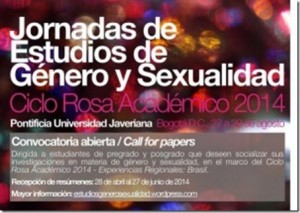
![clip_image001[8] Father Luigi Ciotti with his mentor and friend, the anarchist priest and defender of sodomites issues, the late Don Gallo.](https://dominicansavrille.us/wp-content/uploads/2015/07/clip_image0018.png)
![clip_image001[11] François hand in hand with Luigi Ciotti - priest, leftist activist, and staunch supporter of the homosexual cause.](https://dominicansavrille.us/wp-content/uploads/2015/07/clip_image00111.jpg)
![clip_image001[16] Speaking to the press, Francois bowed deeply to reverently kiss the hand of Michele De Paolis: priest and supporter of gay rights, after the pope concelebrated with him at home Santa Marta, in the Vatican.](https://dominicansavrille.us/wp-content/uploads/2015/07/clip_image001161.jpg)
![clip_image002[9] Pope Francis was named "Person of the Year 2013" by The Advocate, the iconic US magazine promoting the LGBT ideology.](https://dominicansavrille.us/wp-content/uploads/2015/07/clip_image00291.jpg)
